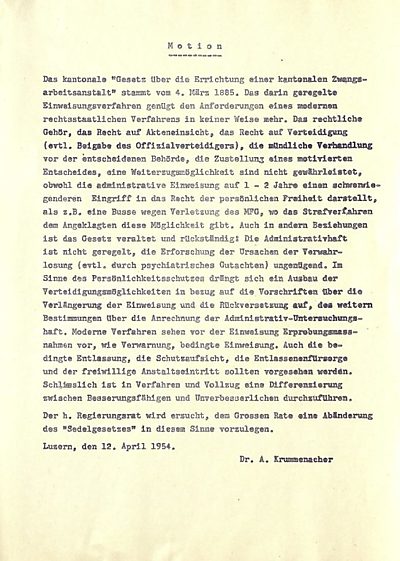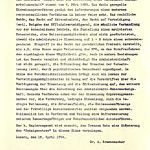Motion to review the «outdated Sedelgesetz» law
 Albert Krummenacher: Motion for a review of the «law on the establishment of a forced labour institution» of 1885, dated 12 April 1954, submitted to the governing council of the canton of Lucerne
Albert Krummenacher: Motion for a review of the «law on the establishment of a forced labour institution» of 1885, dated 12 April 1954, submitted to the governing council of the canton of Lucerne The motion represented a defining moment in the history of legislation on institutionalisation in the canton of Lucerne. It marked the beginning of a lengthy review process, which resulted in the almost seventy-year-old law on institutionalisation being updated. The motion received broad support within the cantonal parliament, whereupon the Grand Council tasked the governing council (the cantonal government of the canton of Lucerne) with drafting a new law.
Research questions
In connection with the formulation of administrative detention laws, the IEC is interested in the arguments that led to laws being enacted or reviewed. This analysis identifies the models used to legitimise the legal bases. With regard to the source presented here, the study looks at both the grounds put forward by the author of the motion and the ensuing debate in the cantonal parliament. Was the motion approved or rejected? Who was Albert Krummenacher, and what were his political views and his professional background? Who supported his cause and who opposed it? The more information can be gathered about the actors and the political context, the easier it is to understand the reasoning behind the arguments put forward. What justification was given for the creation, application and necessity of such a law?
Various sources were drawn upon to answer these questions. The bills and debates on the review of the law illustrate the mindset of the time, which called for the law on institutionalisation to be updated. As no verbatim minutes were taken of the negotiations between the Grand Council and the governing council in Lucerne, researchers have had to refer to press reports instead, bearing in mind the political views of the media in question. Publications by expert groups such as doctors and social workers were also a valuable source of information to reconstruct the contemporary lines of argumentation and policies.
Access to the source
The review brought about by this motion continued up until 1966 and resulted in the «Act on the care and institutionalisation of vulnerable adults». During that time, criticism of the legal bases of administrative detention grew throughout Switzerland, whereupon several cantons abolished their laws on the subject. Nationwide harmonisation of legislation on institutionalisation was achieved in 1981 with the introduction of the deprivation of liberty for the purpose of providing care in the Civil Code and therefore at federal level. This led to a conflict of jurisdiction between the Canton of Lucerne and the Confederation. Back then, as today, in cases such as this, federal law took precedence over cantonal law. And so the law of Lucerne was overridden. This step towards the national legislation of 1981 had been on the horizon for some time, not least due to international pressure. Nevertheless, the Canton of Lucerne was convinced of the need to review its cantonal law and so it implemented this costly project spanning a number of years.
The existence of new nationwide legislation therefore raises the question as to why the Canton of Lucerne wished to review its legislation on institutionalisation. In this context, the prevailing social conditions and changes underway at the time — the 1950s and 1960s — had to be taken into account when analysing the source.
N. Dissler/Translation
Source
Albert Krummenacher: Motion for a review of the «law on the establishment of a forced labour institution» of 1885, dated 12 April 1954, submitted to the governing council of the canton of Lucerne.
Signature: Staatsarchiv des Kantons Luzern (StaLU): A 706/334.
 previous source
previous source
 next source
next source


